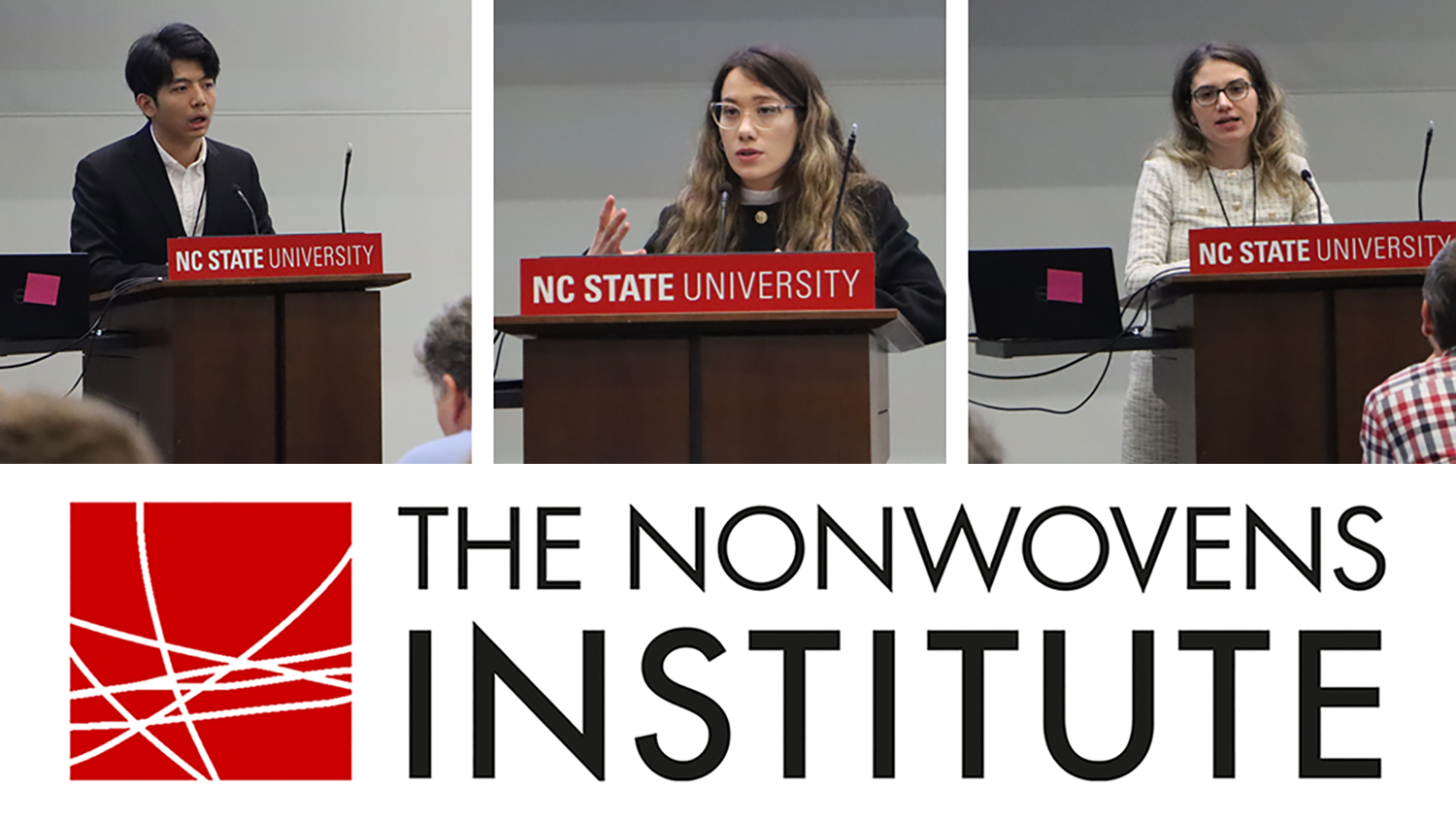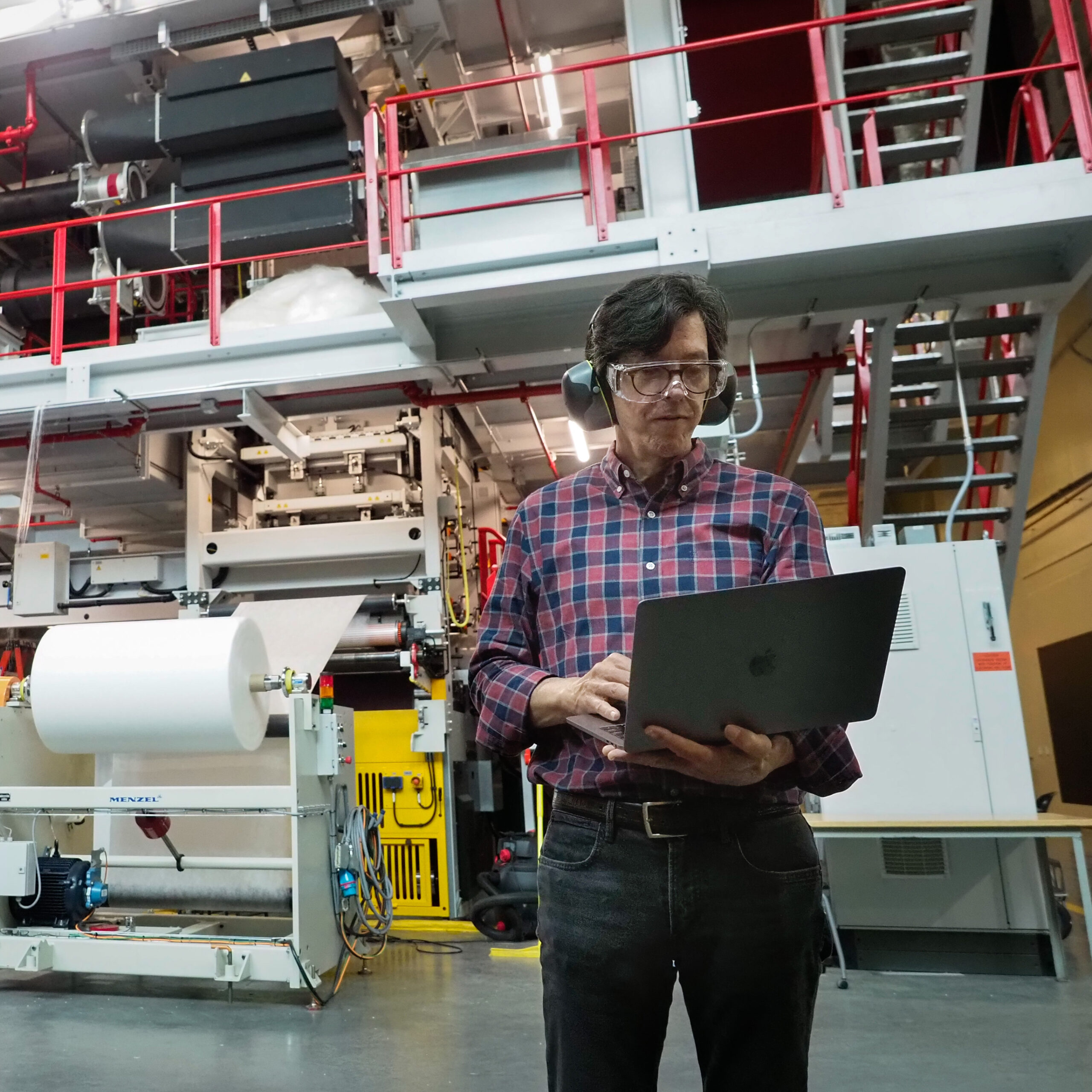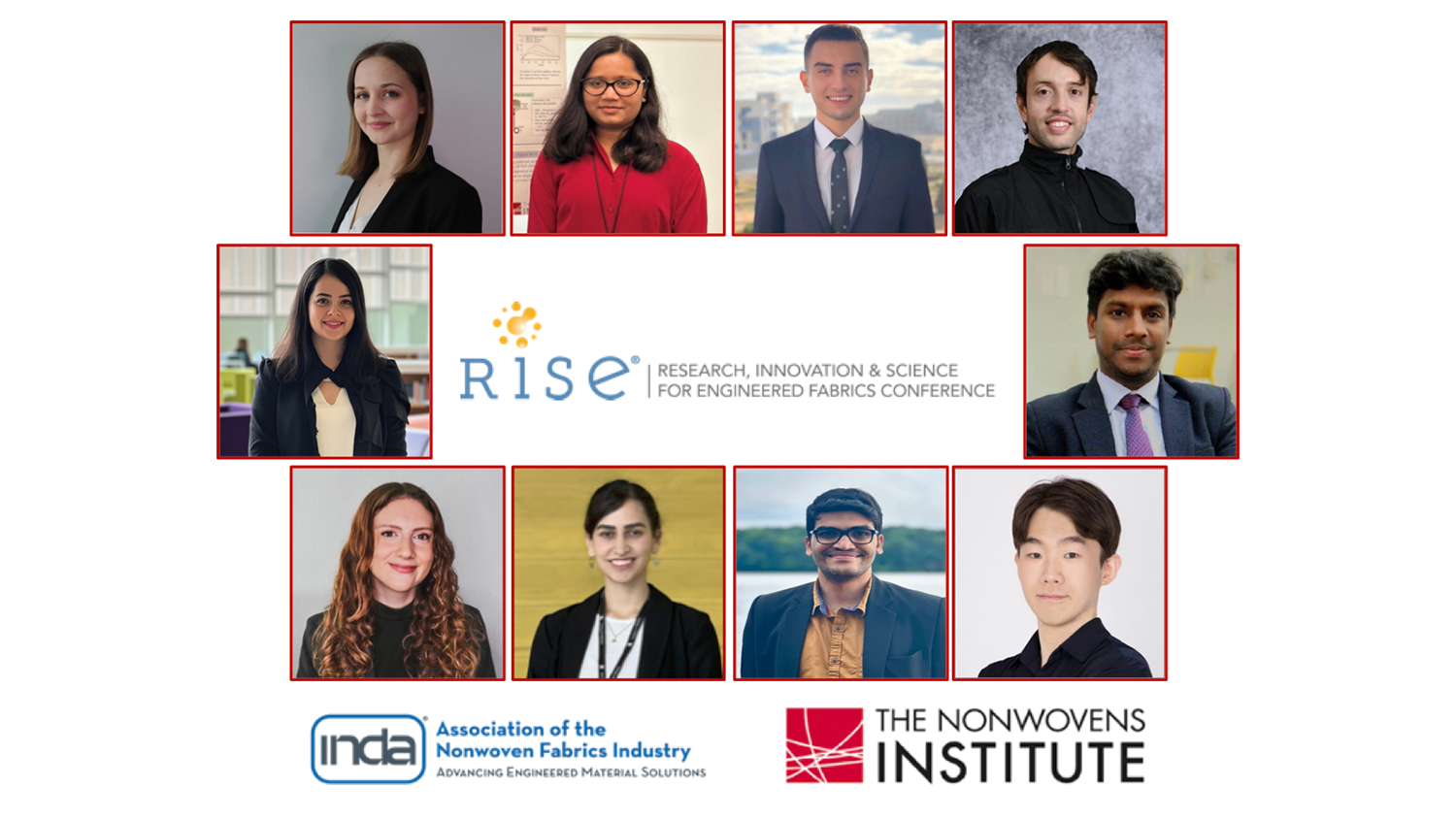The Nonwovens Institute (NWI) would like to congratulate three of its student researchers, Büşra Özdemir, Anastasia Timofeeva and Jingwei Wu, who are preparing to graduate from their doctoral degree programs.
“Here at NWI we are excited to see what will come next for Büşra, Anastasia and Jingwei, as they’ve each made valuable contributions to the institute’s fundamental nonwovens research portfolio,” said Behnam Pourdeyhimi, Ph.D., NWI’s executive director. “We wish them the best of luck and look forward to remaining connected as they progress in their careers.”
Büşra Özdemir, Ph.D., Fiber and Polymer Science, NC State University
“Charging Behavior of Nonwovens”
Büşra will defend her Ph.D. dissertation, “Charging Behavior of Nonwovens,” with the Wilson College of Textiles at NC State in December. Büşra’s industry-selected NWI research project investigates the parameters that impact the efficiency and pressure drop of respirators with the aim of advancing the pursuit of stable filtration efficiency over extended wear times.
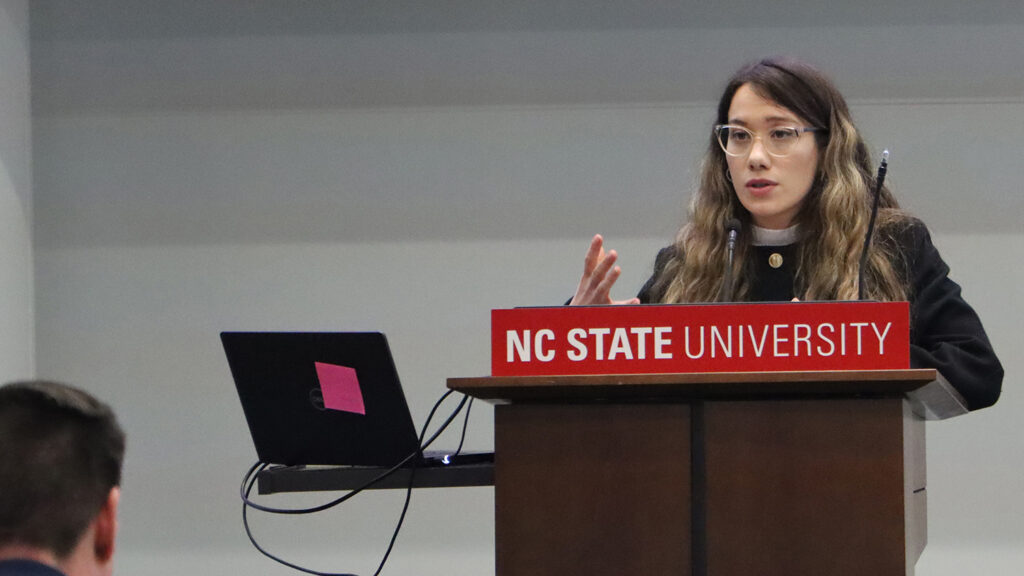
By systematically evaluating the efficiency and pressure drop of respirator filters under different scenarios, Büşra is seeking a deeper understanding of respirator filter behavior to support design improvements for superior performance. This research is intended to contribute to the development of advanced nonwoven materials that provide enhanced filtration efficiency, improved breathability and increased comfort for respirator wearers.
Büşra has presented her research at NWI’s semi-annual Industrial Advisory Board (IAB) meetings since November 2021, with her final presentation at the Spring 2024 IAB meeting.
“My experience at The Nonwovens Institute has been transformative, offering me unparalleled exposure to cutting-edge research in nonwovens and filtration technologies,” said Büşra. “Working alongside leading experts, I gained hands-on experience that deepened my understanding of material properties and their real-world applications in filtration and advanced polymer development. This experience has not only shaped my technical skills but has also fueled my passion for innovation in the nonwovens field.”
Büşra is actively exploring opportunities in industry where she can leverage her research background and technical expertise in a hands-on environment. She is particularly interested in positions focused on innovation and development within polymer science, nonwovens, engineering and filtration systems. Additionally, Büşra is open to postdoctoral roles that would enable her to further expand her research skills and explore new areas of interest prior to transitioning into an industry career.
Anastasia Timofeeva, Ph.D., Mechanical and Aerospace Engineering, NC State University
“Dynamic, In-situ Characterization of Failure Modes in Fiber Spinning”
Anastasia successfully defended her Ph.D. dissertation, “High-Speed Polarization Imaging for Failure Detection In Fiber Spinning,” with the Department of Mechanical and Aerospace Engineering at NC State in September. Anastasia’s industry-selected NWI research project focuses on developing a machine learning (ML) model for near-real-time in-situ monitoring of the fiber spinning process.
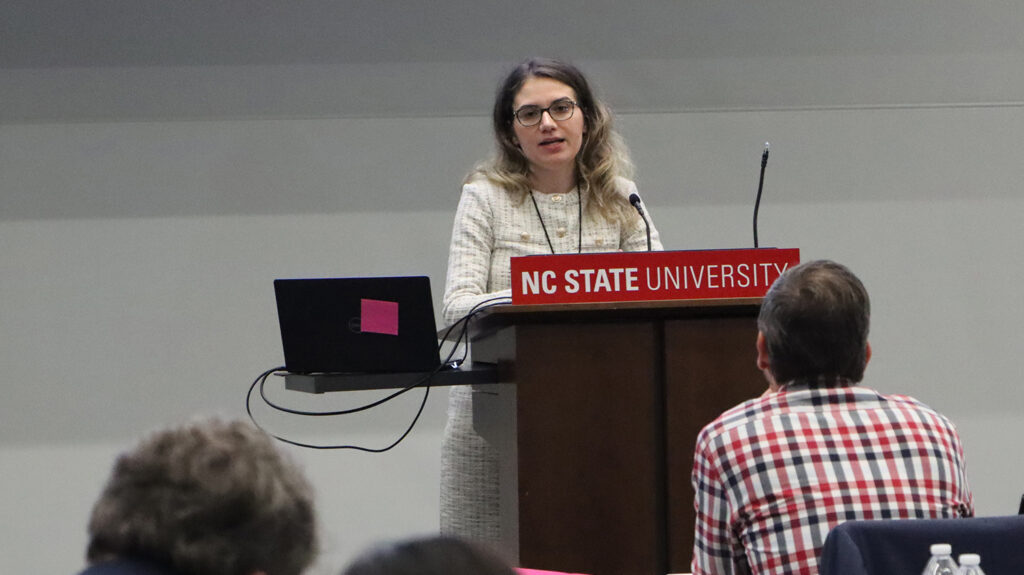
In her research, Anastasia employed high-speed polarized light imaging to measure internal stress fields and the orientation of polymer chains within the fibers as they were being produced. She adapted two optical methods for stress field (defect) measurements within the fibers. In the first method, Quantitative Polarized Light Microscopy (QPLM), Anastasia developed a motion-tracking algorithm and an improved data processing method to enable accurate data analysis while minimizing noise and spatial lag. The second method, Instant Polarized Light Microscopy pi (IPOLπ), increased the imaging acquisition rates, while eliminating the need for motion tracking, thus reducing the computational cost for image analysis.
Prior to pursuing her doctoral degree, Anastasia earned bachelor’s degrees in Physics from the Bloomsburg University of Pennsylvania and in Engineering Science from the Pennsylvania State University. Anastasia has also conducted internships at ASML, analyzing lithography components to minimize sub-micron vibrational effects, and at PPL electric utilities in reliability engineering.
Anastasia has presented her research at NWI’s semi-annual Industrial Advisory Board (IAB) meetings since May 2022, with her final presentation scheduled for the upcoming Fall IAB meeting. Her NWI research was also presented at the Research, Innovation, and Science for Engineered Fabrics (RISE®) Conference in Raleigh, North Carolina, as well as at the Society of Photo-Optical Instrumentation Engineers (SPIE) and at the Society of Experimental Mechanics (SEM) conferences.
Anastasia has published her research in the Journal of Optical Engineering (https://dx.doi.org/10.1117/1.OE.63.4.043103) and is currently working on several more articles to be published in the upcoming months.
“I’ve enjoyed the opportunity to tackle research challenges along with the NWI community,” said Anastasia. “Being able to share the results of my work and receive feedback from the industry members helped me to better understand the production details that need to be considered for the application of my system on the production line. The close interactions within the NWI Graduate Student Group allowed me to strengthen my knowledge about nonwovens as well as build many friendships.”
Anastasia is actively exploring opportunities in industry with the aim of obtaining a position
working in an interdisciplinary R&D or production division with a focus on imaging and data analysis.
Jingwei Wu, Ph.D., Mechanical and Industrial Engineering, University of Illinois Chicago
“Adaptable-Intelligent Filter”
Jingwei successfully defended his Ph.D. dissertation, “Aerosolization Suppression and Nanoparticulate Filtration by Means of Innovative Polymer Usage,” with the Department of Mechanical and Industrial Engineering at the University of Illinois Chicago in October. Jingwei’s industry-selected NWI research project focuses on Poly(N-isopropylacrylamide) (PNIPAM), which is one of the most extensively studied synthetic polymers for forming smart hydrogels due to its thermo-responsive property. The thermo-responsiveness of PNIPAM holds promise for the development of innovative and responsive materials with a wide range of practical applications. As a result, PNIPAM has captured the attention of researchers in various fields, including biomedicine, materials science and microfluidics.
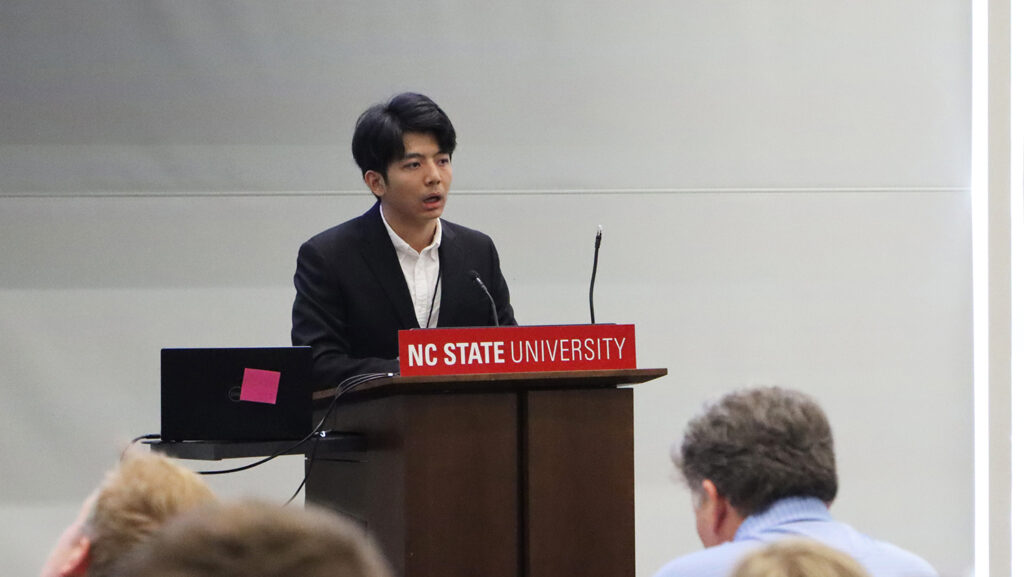
By incorporating PNIPAM hydrogels into water filtration systems, it is anticipated that the filtration efficiency and performance can be significantly improved. The thermo-responsive nature of the filter membranes enables the variation of permeability and selectivity in response to changes in water temperature. Jingwei’s research is utilizing this innovative approach with the goal of enhancing selective separation and purification of substances to provide a more energy-efficient and cost-effective solution for various industries.
Jingwei has presented his research at NWI’s semi-annual Industrial Advisory Board (IAB) meetings since November 2021, with his final presentation scheduled for the upcoming Fall 2024 IAB meeting. He has also published his research in the Journal of Applied Physics, Journal of Membrane Science, Physics of Fluids and International Journal of Multiphase Flow.
Jingwei is exploring opportunities in industry in the United States, where he can apply his research expertise and technical skills in a practical setting. He is particularly interested in roles that focus on innovation and development within polymer science and engineering and filtration systems with a focus on aerosol and airborne particle control. Additionally, Jingwei is considering postdoctoral opportunities that would allow him to further develop his research capabilities and explore new areas of interest before transitioning into industry.
NWI offers graduate students the opportunity to participate in fundamental research in areas that address the pressing challenges in nonwovens applications and technology. Student researchers working through the NWI program benefit from a diverse range of perspectives, working hand-in-hand with subject matter experts from academia and industry.
Students engage with NWI by partnering with faculty from the degree program of their choice. Research projects are developed by faculty and selected by NWI member companies. Students are selected based on their academic performance and capability within the industry-selected research programs. Proposal selection is a competitive process, and NWI does support the submission and selection of research proposals from faculty at other universities.
NWI supports students from a number of academic programs including Fiber and Polymer Science, Chemical and Biomolecular Engineering, Mechanical and Aerospace Engineering, Materials Science and Engineering, Forest Biomaterials, and Biomedical Engineering, as well as students in various engineering programs at partner institutions.
Students who are engaged in an NWI-supported research project will graduate with a degree in the discipline to which they are admitted, but their research will be focused on a topic of relevance to nonwovens.
- Categories:
